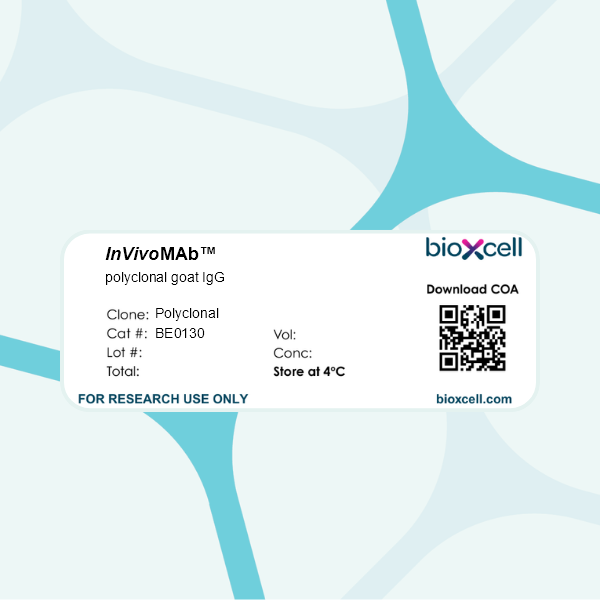InVivoMAb polyclonal goat IgG
Product Description
Specifications
| Isotype | Goat IgG |
|---|---|
| Recommended Dilution Buffer | InVivoPure pH 7.0 Dilution Buffer |
| Conjugation | This product is unconjugated. Conjugation is available via our Antibody Conjugation Services. |
| Formulation |
PBS, pH 7.0 Contains no stabilizers or preservatives |
| Endotoxin |
≤1EU/mg (≤0.001EU/μg) Determined by LAL assay |
| Purity |
≥95% Determined by SDS-PAGE |
| Sterility | 0.2 µm filtration |
| Production | Purified from goat serum |
| Purification | Protein G |
| RRID | AB_10949067 |
| Molecular Weight | 150 kDa |
| Murine Pathogen Tests |
Ectromelia/Mousepox Virus: Negative Hantavirus: Negative K Virus: Negative Lactate Dehydrogenase-Elevating Virus: Negative Lymphocytic Choriomeningitis virus: Negative Mouse Adenovirus: Negative Mouse Cytomegalovirus: Negative Mouse Hepatitis Virus: Negative Mouse Minute Virus: Negative Mouse Norovirus: Negative Mouse Parvovirus: Negative Mouse Rotavirus: Negative Mycoplasma Pulmonis: Negative Pneumonia Virus of Mice: Negative Polyoma Virus: Negative Reovirus Screen: Negative Sendai Virus: Negative Theiler’s Murine Encephalomyelitis: Negative |
| Storage | The antibody solution should be stored at the stock concentration at 4°C. Do not freeze. |
| Need a Custom Formulation? | See All Antibody Customization Options |
Application References
Carretero, R., et al (2015). "Eosinophils orchestrate cancer rejection by normalizing tumor vessels and enhancing infiltration of CD8(+) T cells" Nat Immunol 16(6): 609-617.
PubMed
Tumor-associated eosinophilia is frequently observed in cancer. However, despite numerous studies of patients with cancer and mouse models of cancer, it has remained uncertain if eosinophils contribute to tumor immunity or are mere bystander cells. Here we report that activated eosinophils were essential for tumor rejection in the presence of tumor-specific CD8(+) T cells. Tumor-homing eosinophils secreted chemoattractants that guided T cells into the tumor, which resulted in tumor eradication and survival. Activated eosinophils initiated substantial changes in the tumor microenvironment, including macrophage polarization and normalization of the tumor vasculature, which are known to promote tumor rejection. Thus, our study presents a new concept for eosinophils in cancer that may lead to novel therapeutic strategies.
Product Citations
-
-
Cancer Research
CD200R signaling contributes to unfavorable tumor microenvironment through regulating production of chemokines by tumor-associated myeloid cells.
In iScience on 16 June 2023 by Lin, C. H., Talebian, F., et al.
PubMed
CD200 is overexpressed in many solid tumors and considered as an immune checkpoint molecule dampening cancer immunity. In this study, we found that CD200R-/- mice were significantly more potent in rejecting these CD200+ tumors. scRNA sequencing demonstrated that tumors from CD200R-/- mice had more infiltration of CD4+ and CD8+ T cells, and NK cells but less infiltration of neutrophils. Antibody depletion experiments revealed that immune effector cells are crucial in inhibiting tumor growth in CD200R-/- mice. Mechanistically, we found that CD200R signaling regulates the expression of chemokines in tumor-associated myeloid cells (TAMCs). In the absence of CD200R, TAMCs increased expression of CCL24 and resulted in increased infiltration of eosinophils, which contributes to anti-tumor activity. Overall, we conclude that CD200R signaling contributes to unfavorable TME through chemokine-dependent recruitment of immune suppressive neutrophils and exclusion of anti-cancer immune effectors. Our study has implications in developing CD200-CD200R targeted immunotherapy of solid tumors.
-
-
-
Biochemistry and Molecular biology
-
Cancer Research
-
Immunology and Microbiology
Conserved transcriptional connectivity of regulatory T cells in the tumor microenvironment informs new combination cancer therapy strategies.
In Nat Immunol on 1 June 2023 by Glasner, A., Rose, S. A., et al.
PubMed
While regulatory T (Treg) cells are traditionally viewed as professional suppressors of antigen presenting cells and effector T cells in both autoimmunity and cancer, recent findings of distinct Treg cell functions in tissue maintenance suggest that their regulatory purview extends to a wider range of cells and is broader than previously assumed. To elucidate tumoral Treg cell 'connectivity' to diverse tumor-supporting accessory cell types, we explored immediate early changes in their single-cell transcriptomes upon punctual Treg cell depletion in experimental lung cancer and injury-induced inflammation. Before any notable T cell activation and inflammation, fibroblasts, endothelial and myeloid cells exhibited pronounced changes in their gene expression in both cancer and injury settings. Factor analysis revealed shared Treg cell-dependent gene programs, foremost, prominent upregulation of VEGF and CCR2 signaling-related genes upon Treg cell deprivation in either setting, as well as in Treg cell-poor versus Treg cell-rich human lung adenocarcinomas. Accordingly, punctual Treg cell depletion combined with short-term VEGF blockade showed markedly improved control of PD-1 blockade-resistant lung adenocarcinoma progression in mice compared to the corresponding monotherapies, highlighting a promising factor-based querying approach to elucidating new rational combination treatments of solid organ cancers.
-

